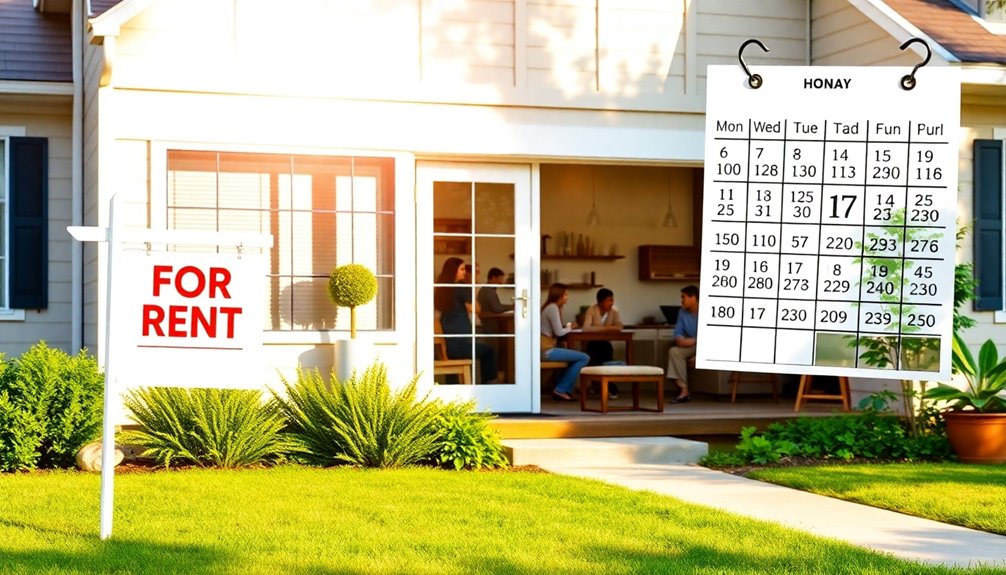Buying a home for your college kid can save you thousands in housing costs while offering impressive financial benefits. You'll lock in stable monthly payments, potentially avoid rising rental rates, and even benefit from rental income if you let out extra rooms. Plus, property values often appreciate, acting as a long-term investment. With tax deductions on mortgage interest and property taxes, you'll maximize your savings. Discover how this decision can change your financial landscape for the better!
Key Takeaways
- Buying a home can significantly reduce housing costs compared to on-campus living or renting off-campus.
- Renting out extra rooms can generate passive income, covering mortgage payments and alleviating financial stress.
- Real estate typically appreciates over time, serving as a long-term investment that outpaces inflation.
- Homeownership offers tax deductions on mortgage interest and property taxes, lowering overall financial obligations.
- A stable home environment enhances your child's college experience, potentially improving academic performance and well-being.
Reduced Housing Costs: A Smart Financial Move

When it comes to housing for your college kid, buying a home can save you thousands.
Consider the costs: on-campus room and board can range from $11,140 to $12,680 annually, while off-campus housing averages around $27,180 for nine months.
Over four years, these expenses add up quickly. By purchasing a home, you can lock in a fixed housing cost, significantly reducing your financial burden. Additionally, owning a home might provide long-term savings versus renting or dorm fees. You'll not only protect yourself from rising housing costs but also create a stable environment for your child.
This strategic move can lead to substantial financial relief during their college years, making it a smart investment for both of you. Furthermore, in high-growth college areas, there is potential for property appreciation that can further enhance the financial benefits of your investment.
Potential for Rental Income: Offset Your Expenses

Buying a home for your college kid not only provides stability but also opens the door to potential rental income that can significantly offset your expenses.
The strong rental market in college towns ensures consistent demand, making it easier to find roommates to share the cost. By renting out extra rooms, you can cover most, if not all, of the mortgage payments, creating a steady cash flow. Roommates can help offset mortgage costs, allowing you to further ease your financial burden. Additionally, understanding market trends can help you maximize rental income and ensure your investment remains profitable.
Once the mortgage is paid off, any additional rent transforms into passive income. This strategy not only reduces your financial burden but also positions you for potential long-term gains as property values appreciate.
Investing in a home for your child can become a smart financial decision, letting you capitalize on the rental market while supporting their education.
Long-Term Investment: Building Wealth Through Real Estate

Investing in real estate can be a powerful way to build long-term wealth, especially when you consider the potential for appreciation and stable demand. Over time, property values typically increase, providing a solid foundation for financial growth. In high-demand areas, such as urban centers, this appreciation can significantly outpace inflation, maintaining your purchasing power. Real estate also satisfies a fundamental need for housing, ensuring consistent demand even during economic downturns. By choosing to invest for your college kid, you're not just providing a home; you're creating a tangible asset that can be passed down through generations. This strategic investment can help you build multi-generational wealth while increasing financial stability and mitigating risks associated with other investment types. Additionally, real estate acts as a hedge against inflation, making it an even more attractive investment during uncertain times. Furthermore, emerging technologies in construction and property management can enhance the value and efficiency of your investment.
Tax Benefits: Maximizing Your Financial Advantage

Owning a home for your college kid not only serves as a place to live but can also unlock a range of tax benefits that enhance your financial position. You can deduct mortgage interest on both the primary residence and this second home, which significantly reduces your taxable income and tax liability. Additionally, property taxes are deductible, further lowering your overall tax burden. If your college kid rents out part of the home, you can report that rental income and deduct related expenses like maintenance and utilities. This arrangement allows you to take advantage of prorated expenses between personal and rental use, maximizing your overall deductions.
Navigating Mortgage Options: Finding the Right Fit

When you're considering a home for your college kid, navigating the mortgage landscape can feel overwhelming.
Start by exploring different types of loans. FHA loans require a credit score of at least 580, while VA loans offer no down payment but need military service. Conventional loans usually need a 620 score and a lower DTI ratio. High debt relative to income can hinder mortgage qualification; student loans may be deferred, providing some relief. Additionally, it's important to consider local building codes that may affect property modifications for your college kid's needs.
If you're looking for lower-down payment options, check out Fannie Mae HomeReady or Freddie Mac Home Possible loans. Also, consider using co-signers to boost eligibility.
Research state and local programs, as many offer down payment assistance. Understanding credit scores and DTI ratios is key, so keep these factors in mind to find the right mortgage fit for your situation.
Lifestyle and Educational Benefits: Enhancing the College Experience

While many college students juggle the pressures of academics and social life, having a stable home can significantly enhance their experience. A stable home provides a supportive environment that allows students to focus on their studies and engage meaningfully in social activities. This support can be especially crucial for those who are struggling with agerelated work issues, as it offers a safe space to recharge and find balance. Ultimately, a nurturing home setting empowers students to thrive both academically and socially, easing the transition into adulthood.
Owning a home offers stability and control, eliminating the hassle of annual housing changes. You can personalize your space, creating an environment that boosts focus and well-being. This independence allows you to choose your roommates and manage your living conditions, reducing stress related to housing. Moreover, homeownership provides an investment opportunity that builds equity over time, further supporting financial stability. Additionally, establishing a retirement savings plan early can provide long-term financial benefits.
A consistent living arrangement can improve academic performance by minimizing distractions and supporting a regular routine. Additionally, owning a home might qualify you for in-state tuition, saving you thousands.
Plus, renting out extra rooms can generate income, making homeownership a smart long-term investment while enriching your college life.
Frequently Asked Questions
How Does Homeownership Affect My Child's Financial Aid Eligibility?
Homeownership can significantly impact your child's financial aid eligibility.
If you own a primary residence, its equity isn't counted on the FAFSA, which can help maximize aid.
However, if your child owns a home, it may be considered an asset, potentially reducing their financial aid.
Parental assets, including equity in second homes, are assessed at 5-6%, so understanding these factors is crucial for effective financial planning for your child's education.
What Are the Maintenance Costs Associated With Owning a Rental Property?
When you own a rental property, maintenance costs can feel like a constant companion, often ranging from 1% to 4% of the property's value each year.
You'll need to consider factors like the property's age and location. Regular tasks, like HVAC filter replacements or pest prevention, can add up, while seasonal jobs, like pool maintenance, might hit your budget hard.
Setting aside funds for these costs helps you stay ahead of unexpected expenses.
Can My Child Manage the Property Independently While Studying?
Your child can manage the property independently while studying, but it might be challenging.
They'll need to balance academics with responsibilities like maintenance and tenant management. If they're organized and proactive, they can handle it, but it might distract them from their studies.
Encourage them to set clear boundaries with tenants and seek help when needed.
Ultimately, it's about finding a balance that works for their academic and personal life.
What if the Property Value Decreases After Purchase?
Imagine purchasing a home that suddenly loses value; it's unsettling, right?
But if that happens, you've still got options! Renting it out can generate income, helping cover costs despite the depreciation.
Plus, holding onto the property long-term might lead to future appreciation. Regular maintenance ensures it stays appealing, and tax benefits can offer relief.
Embrace adaptability; the market fluctuates, but strategic planning can keep you ahead, even in challenging times.
How Can I Ensure a Good Return on Investment in Real Estate?
To ensure a good return on investment in real estate, start by researching local market conditions and focusing on high-growth areas.
Calculate your ROI by considering factors like rental income and capital appreciation.
Diversifying your investments can help manage risks, while leveraging financing can enhance your returns.
Don't forget to monitor property maintenance and conduct regular inspections to protect your asset's value.
A long-term approach often yields the best results in real estate.
Conclusion
Investing in a home for your college kid can be a game-changer, turning costs into savings and creating a nest egg for the future. With potential rental income and tax benefits, you're not just buying a property; you're planting a money tree that could flourish for years. Plus, the boost to their college experience is priceless. So, why not take the plunge? You might just find that this decision pays dividends beyond your wildest dreams.
References
- https://www.investopedia.com/articles/personal-finance/022217/getting-mortgage-while-being-student.asp
- https://smithandberg.com/blog/heres-why-buying-for-your-college-student-makes-sense
- https://www.rocketmortgage.com/learn/buying-property-as-a-student
- https://www.bogleheads.org/forum/viewtopic.php?t=203558
- https://jsada.njlenders.com/blog/3-reasons-to-consider-purchasing-a-home-for-your-college-student
- https://markcas.njlenders.com/blog/3-reasons-to-consider-purchasing-a-home-for-your-college-student
- https://themortgagereports.com/115713/buying-property-in-a-college-town
- https://www.doorloop.com/blog/student-housing-statistics
- https://www.realpage.com/analytics/average-student-housing-rents-ranked-state/
- https://www.apmortgage.com/blog/is-it-smart-to-buy-property-for-your-college-student









